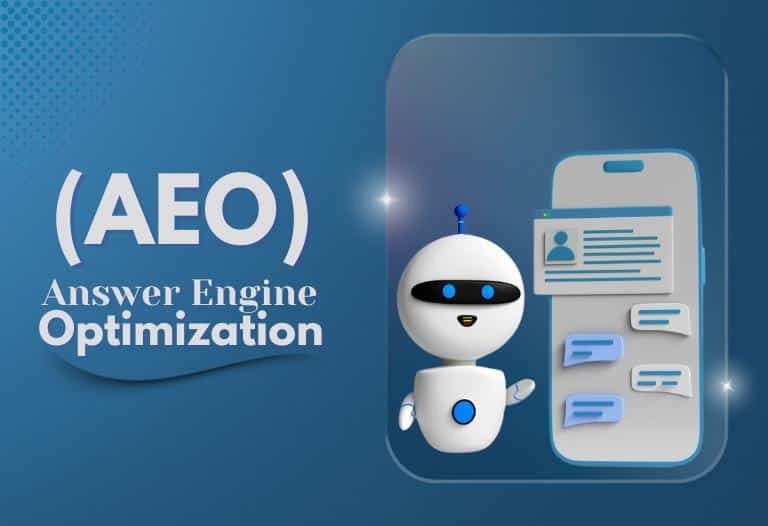As search behavior rapidly evolves, the digital world is moving away from traditional keyword-based searches toward AI-driven, conversational queries. Tools like ChatGPT, Gemini, Perplexity AI, and voice assistants such as Siri and Alexa are changing how people find information. Instead of browsing through long lists of links, users now expect direct, accurate, and conversational answers. This major shift has given rise to a new discipline known as Answer Engine Optimization (AEO). AEO ensures that your content is easily understood and selected by AI systems, making your brand visible in an era where instant answers dominate.
What Is Answer Engine Optimization?
Answer Engine Optimization is the practice of creating and structuring content so that AI-based answer engines can extract concise and reliable responses for users. While traditional SEO focuses on ranking webpages, AEO focuses on becoming the best possible answer. AI tools scan websites for clarity, accuracy, formatting, and semantic meaning, not just keywords. This makes well-structured, conversational, and authoritative content more important than ever. In the AI-first search environment, the goal is not just to rank high—it is to be the source AI trusts the most.
Why AEO Matters in an AI-First Search World –
The importance of AEO is growing because search habits are shifting dramatically. Users are no longer searching in fragmented keywords but asking full, natural-language questions. AI tools provide immediate responses, reducing the need to click through multiple websites. If your content does not meet the requirements of AI extraction, your brand may become invisible, even if you traditionally rank well on Google. AEO also matters because it increases visibility on voice search platforms, chatbots, virtual assistants, and AI-generated summaries. By adapting early, brands can capture a large share of AI-powered traffic.
How Search Behavior Is Transforming –
Modern users expect convenience. They want quick answers, simple explanations, and instant solutions. Instead of typing “best CRM tools,” they now ask questions like “What is the best CRM for small businesses?” AI systems respond with full explanations, summaries, and curated suggestions based on available content. This means brands must produce content that mirrors how people speak, think, and search. Businesses that adapt to these conversational search patterns will remain visible across AI platforms.
Core Elements of AEO –
AEO relies on several essential elements that help AI engines understand and prioritize content. The first is clear and structured writing, which includes short paragraphs, descriptive headings, and direct answers at the beginning of each section. Next is semantic SEO, which focuses on meaning rather than repeated keywords. AI tools evaluate how deeply you cover a topic and whether your content aligns with user intent. Another critical element is authority and factual accuracy, as AI tends to select content that demonstrates expertise. Additionally, having FAQ sections and Q&A formatting supports answer extraction. Finally, structured data and schema markup help search engines interpret your content more accurately.
Strategies to Improve Your AEO Performance –
To improve AEO, brands should begin by writing in a conversational tone that reflects how users ask questions. It is also essential to optimize for voice search, as these queries are typically longer and more natural. Another important strategy is focusing on E-E-A-T (Experience, Expertise, Authority, Trust), which helps build credibility. Brands should offer short, direct responses at the beginning of each topic, followed by detailed explanations. Building content clusters and topic hubs allows AI to view your website as an authority in your niche. These strategies help ensure your content is ready for AI-first consumption.
AEO in Real-World Application –
A practical example helps illustrate the power of AEO. Imagine someone asks an AI tool, “Which sunscreen is best for oily skin?” The AI will choose a source that offers clear recommendations, simple ingredient explanations, and structured comparisons. The brand that has well-organized, straightforward, and deeply informative content will likely become the chosen answer—even if it is not ranked number one on Google. This demonstrates why AEO is crucial for visibility in the new search landscape.
Conclusion –
Answer Engine Optimization is becoming essential in the AI-first search era. As user expectations shift from browsing to receiving instant answers, brands must adapt by creating content that is clear, authoritative, and structured for machine understanding. AEO enables businesses to remain visible across chatbots, voice assistants, AI platforms, and emerging search tools. By embracing AEO now, companies position themselves to lead the future of digital search—not just by ranking well, but by becoming the trusted answer that AI engines rely on.

